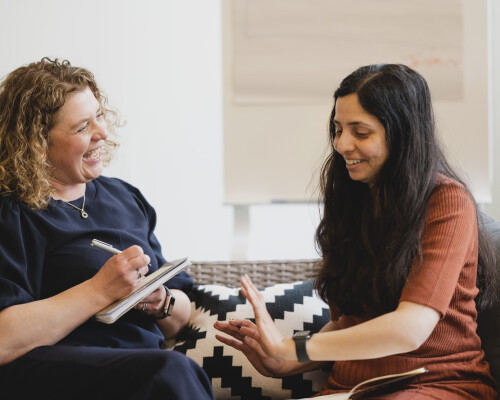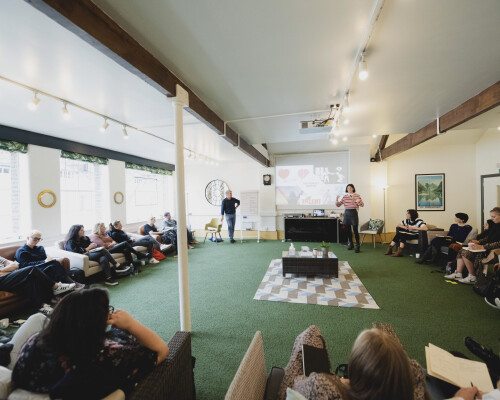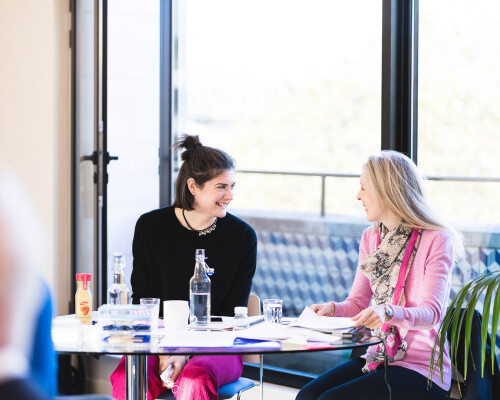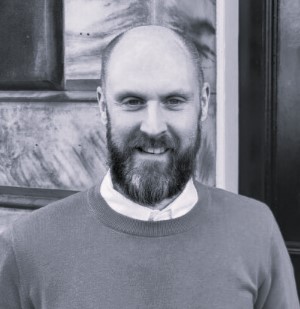We recently spoke with Chloe about the myths and motivations of Generation Z, and what leaders can learn from her research.
You can listen to the full podcast episode HERE
Chloe has interviewed 20,000 young people globally, and her expertise and patented data has her in huge demand with global companies, brands and governments.
In this article, she answers 8 frequently-asked questions about Generation Z.
1. Are Gen Z universally 'woke'?
''It drives me bonkers when you open a newspaper or listen to any misinformed politician that says every Gen Z is woke. It’s this idea that Generation Z are this easily offended, hyper-liberal, monolithic, snow-flakey, all-think-the-same generation – and that’s just not true.
When you go into schools and you ask them about any major issue – pronouns, gender, race, politics, abortion, immigration, voting, or the death penalty – it’s always very mixed and complicated. What you’re seeing is a swing towards something which is more conservative or Centrist.
In a lot of youthful spaces there has been a push towards very liberal, very tolerant politics. But this notion that young people are this monolithic blob of liberalism is absolute nonsense.''
2. Does Gen Z care more about ethics than money?
''Ethical, decent companies and brands are very attractive to Gen Z. But the sweet spot for young people – and this will be true for Gen A – are the companies that fulfil the self-interest; jobs that are well-paid, pleasurable, interesting to work at, and with prospects. All of those things coupled with purpose and values.''
3. What motivates Gen Z?
''One of the biggest drivers of poor mental health for young people isn’t so much challenges, but it’s the things you don’t have any control over. A sense of loss of control, that it’s happening beyond you and there’s nothing you can do to change it. That falls in with climate change, and a lot of young people feel that politics has completely broken down and ceased to work, and the economy only works for a small sub-set of people.
People will stick at things and work at things they think they can change, and that’s what a lot of companies don’t understand. As an absolute priority, they have to make young people feel that they’re key to change. If people feel like they have power and autonomy, they’ll show up.''
4. What can Gen Z teach us about mental health?
''The influence of Generation Z has been absolutely key for Gen X men – men in their late 40s to late 50s, who will have come from a generation where ‘men were men’. You didn’t talk about your problems, you just dealt with stuff and took it on the chin. That was catastrophic for lots of men, this idea of suffering in silence. But there has been a good influence that’s flowed upwards. We’re now awash with really fantastic brands, campaigns and movements that are urging men to open up and communicate and not suffer in silence . And that’s a direct consequence of a generation who have very openly said: it’s not a taboo to say that I’m suffering.''
5. What's the best leadership style for Gen Z?
''We’re really hampered by this idea of the alpha boss. It doesn’t look strong, it looks incredibly retrograde. It doesn’t cultivate longevity, and people burn out.
I did a talk at the European Central Bank in Germany. It’s a very different culture out there. There were men and women from some of the most powerful industries and companies in the world, who had a direct line to world leaders. They were fascinated with how they could tune into the next generation and become better leaders and listeners.
A sympathetic and empathetic work culture is really important. It’s a modelling process. It’s the idea that people at the top – particularly older people - will say: this is an open space, and I will talk about the things that are worrying me, and we welcome you to do the same.''
6. What's the best approach to flexible working?
''We’re not going to go back to Monday to Friday in the office, it’s completely unrealistic. I think it’s a minority of people who want that and benefit from that. But at the same time we can’t abandon work and office culture. It’s impossible to develop a culture when completely remote. Going out for coffee, making friends, and making a community is really important for the wellbeing and success of any company.
You learn so much when working with people, and you can do that remotely, but I think it’s better in person – throwing ideas around in a physical space.
However, companies need to think about how they approach that. They need to make it project and purpose-driven, rather than an arbitrary rule that you have to come in on Tuesdays, Wednesdays and Thursdays. They need to make that time meaningful and structured, where people think: that was a really good day, I’m glad I did that - rather than - It’s Tuesday, I’ve got to come into the office.''
7. What's the best way to mentor Gen Z in the workplace?
''The assumption is that the best person to mentor and train Gen Z graduates is their nearest in age – Millennials. Quite often, that doesn’t work. What I’m seeing when I’m going into a lot of assessed companies, is an interesting harmony between Gen Z graduates and older workers – Gen Xers who are their parents’ age. They are less threatened by new recruits and are easy-going on them. There’s a gentle wisdom that Gen Z find quite appealing. It’s a good dynamic. Similarly, Millennials get on well with the Boomer generation.''
On Reverse Mentoring, with Gen Z as mentors.
''I don’t think that learning is a trickle down process, it’s circular. And in this day and age, strict hierarchies don’t work anymore. It isn’t a one-way street.
There are skills that are critical to the modern world, that would have go over the head of someone who has been in the workplace for 30 years.
When you go into companies that do really work, it’s because there is this listening facility, and managerial people are taking the skills of young people seriously.''
8. Are Gen Z only interested in entrepreneurship?
''Everyone was a frustrated millionaire in the 20th century, now everyone is a frustrated entrepreneur.
Those who have come of age online have this notion that anyone with a pioneering, entrepreneurial spirit can become the next Elon Musk. The LinkedIn culture is riddled with these hyperbolic stories: I started this in my living room with my mates, and a week later we got nine-figure seed funding.
That potential, that alchemy of turning social media into something lucrative, is fantastic. The trouble is, it has a dark side and the vast majority of people will have a great idea that doesn’t turn into the next Meta.
It feels to a lot of young people that if you don’t make it in that space, you are a failure. Kids don’t get excited by stories of people graduating university and starting a job. The more traditional path of becoming a doctor, a teacher, an architect – is now considered lesser and inferior to being a pioneer who became a millionaire on the internet. There is a profound sense of pessimism and crushed dreams.
But look at the pandemic – it wasn’t Elon Musk or a social media influencer than saved the day, it was the doctors and nurses and delivery people who were the heroes.
We need to continue celebrating people who build houses, and cut hair and teach kids.''
Explore Chloe's work





